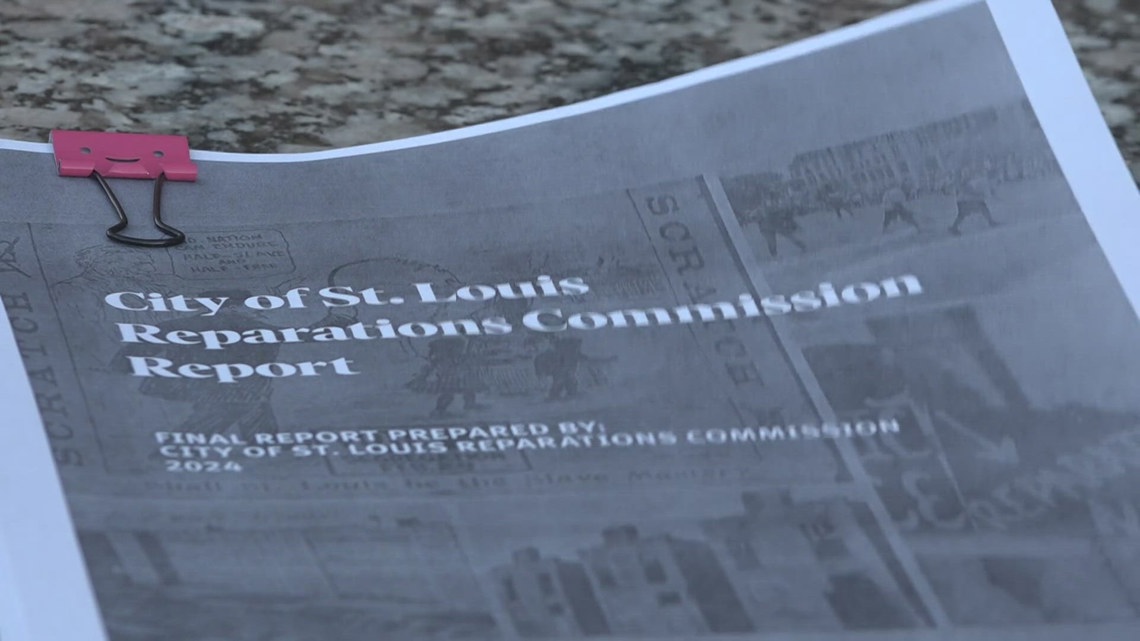
St. Louis has a deep history of racial injustice. The St. Louis Reparations Commission found some of those injustices are still happening today.
ST. LOUIS — The St. Louis Reparations Commission has delivered their final report to Mayor Tishaura Jones.
For the past year and a half, they’ve held 27 listening sessions all across the city.
The Reparations Commission was tasked with assessing the history of slavery, segregation and other race-based harms in St. Louis. Its 124-page report details how the city can do better to improve the lives of black St. Louisans.
“We have two categories for recommendations restitution-oriented and policy-oriented,” Reparations Commission Vice Chair Dr. Will Ross said.
The commission heard from the public and has now made recommendations in several key areas. Below are direct excerpts from the report.
Housing and neighborhood development
Restitution:
- Establish a fund to provide housing grants to descendants of enslaved people and residents of historically redlined neighborhoods.
- Launch programs that provide financial assistance for homeownership, home repair, and property tax relief in historically disadvantaged areas.
- Allocate land for affordable housing developments specifically benefiting Black residents impacted by discriminatory practices.
- Offer a grant for Black homeowners in historically disinvested neighborhoods that provides resources for essential home repairs and property tax relief. This initiative aims to mitigate displacement and promote community stability, helping to preserve long-term homeownership and strengthen local neighborhoods. Dr. Ross said housing and neighborhood development is one of the recommendation areas.
The commission believes the city needs to further invest in rebuilding neighborhoods filled with vacant homes and empty lots and address the lack of affordable housing.
“We have to provide resources, and we spelled out grants of up to $25,000 or so for individuals, for families to actually secure a down payment,” Ross said.
Targeted cash payments to Black residents subject to specific historical harms
- Provide additional cash payments for reparations of up to $25,000 for designated communities with documented direct harm. These would include former residents or direct descendants of residents of Mill Creek Valley, the Pruitt-Igoe housing project and McRee Town. As we recognize that the displacement associated with these areas resulted in the denial of opportunity for families to accrue intergenerational wealth, we intend this targeted restitution to be provided to documented direct descendants of residents in cases in which the former residents themselves are no longer living.
The report said displaced Black families who lived in areas such as Mill Creek Valley, where the CITY SC soccer stadium is now, should be compensated.
“We asked for an apology in the report, but we want to acknowledge that we wanted to follow up with some direct payments, not just the Mill Creek Valley, but direct payments to Pruitt Igoe and McCree Town,” Ross said.
Public health
Public health was another area of concern. The Black community has been disproportionately affected due to a lack of resources leading to shorter life expectancies.
“We want people to have health services and public health services to ensure that they will be living well and living long,” he said.
Restitution:
- Establish a community health fund to address racial disparities in healthcare access and outcomes for Black residents.
- Expand access to free or low-cost health care services for low-income residents, focusing on health equity.
- Increase funding for community health centers in Black neighborhoods to establish dedicated centers that specifically address intergenerational trauma and stress related to systemic racism. These centers should provide culturally competent mental health services, including counseling, support groups, and educational workshops, while also offering comprehensive health care services, preventive care and wellness programs tailored to the unique needs of the community. Collaboration with local organizations, such as Affinia Healthcare, ARCHS, The T and the Restorative Justice Movement Community, will ensure effective outreach and support for residents.
- Maintain sufficient funding to the health department so that it is less dependent on federal grants to support core functions.
Education
Restitution:
- Create scholarships and educational grants for descendants of enslaved people and Black students from historically underserved areas.
- Provide funding for educational equity programs, such as after-school tutoring, mentorship, and technology access in predominantly Black schools.
- Support the development of an African-American history curriculum in public schools, ensuring that students are educated about the local history of racial injustice.
- Increase funding to St. Louis Public Schools for higher teacher salaries, recognizing the unique role SLPS plays in combatting decades of outmigration and diminishing resource allocations for public education in the city.
- Establish a free Wi-Fi program in St. Louis.
Ross said Black neighborhoods are seeing school closures.
“There’s not enough funding in there. The school closures have been interpreted as the community is depopulating. Black people are leaving also. It’s not white flight, it’s Black flight. And so, therefore, the school closures are just a consequence of that,” Ross said.
Economic justice and wealth creation
Restitution:
- Provide direct financial reparations in the form of cash payments or tax relief to descendants of enslaved people and Black residents.
- Fund Black-owned businesses through grants, low-interest loans and technical support programs.
- Launch job training and entrepreneurship programs aimed at reducing unemployment and economic disparities in Black communities.
Criminal justice and policing
Restitution:
- Establish a reparations fund for victims of police violence, starting with a baseline minimum of $25,000 for each documented incident.
- Implement community-driven alternatives to policing, such as restorative justice programs and mental health crisis response teams, in part through the reallocation of budget funds presently allocated to the Municipal Police Department. This measure will reduce existing over-spending on police and the risk of continued harms associated with this pronounced presence and diffuse the tasks for which the police department serves as front-line responders to other agencies better equipped to address.
- Increase civilian oversight and accountability in the St. Louis police department, particularly in cases of misconduct against Black residents.
Ross said stronger civilian oversight of the St. Louis Metropolitan Police Department would go a long way for citizens.
“They have to be held accountable,” he said. “I think that would be reassuring for Black men that they can walk the streets of St. Louis and not have a driving-while-Black or walking-while-Black ticket.”
Recommendations for state violence and legal reform
Restitution:
- Acknowledge and address the long history of state-sanctioned violence, including police brutality and the criminalization of Black people, within both the official apology and formal history adopted via the related recommendations outlined above.
- Expunge the criminal records of individuals convicted of non-violent offenses related to systemic racial injustice, such as drug-related offenses.
- Advocate for legal reforms that reduce mass incarceration and support community-led safety initiatives.
A public verbal and written apology for these injustices is also requested in the document.
Ross said to make sure change happens, there needs to be a permanent Reparations Oversight Committee.
“We want to make sure that this is going to be acted upon and reviewed annually, if not more frequently,” he said.
Conner Kerrigan with St. Louis Mayor Tishaura Jones’ office said in a statement, “We appreciate the hard work of the Reparations Committee, and we recognize the need to repair the generational harm created by the legacy of chattel slavery and centuries of racist practices and policies both nationally and locally. We are conducting a full analysis of the report to see which of these further recommendations are possible and feasible.”


